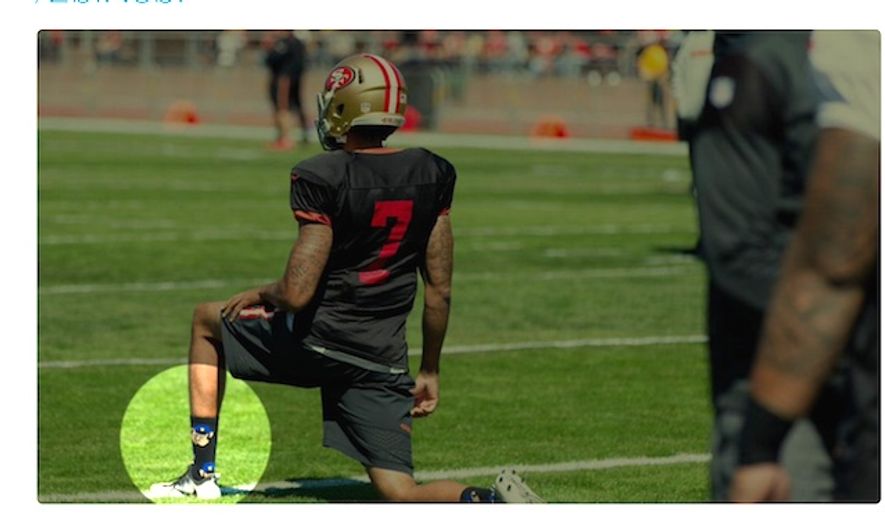I wonder if Nike will be marketing Colin Kaepernick socks? You know, the ones he wore two years ago — the socks that depicted police officers as pigs?
Nike loves to embrace counterculture, but I suspect that may be a bridge too far, even for Nike. I imagine that Nike and Kaepernick would just as soon see those photos of him wearing cop pig socks two years ago during a San Francisco 49ers practice just disappear.
But they haven’t.
And I believe the pig socks may be just as responsible for keeping Kaepernick out of the NFL as his kneeling during the national anthem to protest police brutality. It was a step too far for police organizations around the country, and the NFL has to do business with police departments on game day.
Based on the statement released by the national Fraternal Order of Police in response to Nike featuring Kaepernick as part of its 30th anniversary “Just Do It” campaign on the eve of the start of the NFL season, the police certainly haven’t forgotten:
“If Nike chooses to create an ad campaign featuring a former quarterback who describes cops as ’pigs’ … they are free to do so.”
AUDIO: Redskins great Joe Theismann with Thom Loverro
When the photos appeared two years ago of Kaepernick wearing the pig socks, he tried to defend it on Instagram:
“I wore these socks, in the past, because the rogue cops that are allowed to hold positions in police departments, not only put the community in danger, but also put the cops that have the right intentions in danger by creating an environment of tension and mistrust.”
Like any slur, though — and make no mistake about it, this is a slur — it was a weak defense for a moment Kaepernick, who has been out of the league since March 2017 and has filed a collusion grievance against the NFL, would likely not have connected to his more publicized and embraced protest of kneeling during the anthem.
It requires a convenient and complicated memory to praise Nike’s Kaepernick campaign as some sort of social justice victory.
It means Kaepernick ignoring the human rights abuses by his benefactor. I mean, what sort of socks would he wear to depict workers in sweatshops?
“During the last three years, Nike has continued to treat the sweatshop issue as a public-relations inconvenience rather than as a serious human rights matter,” Leila Salazar, corporate accountability director for Global Exchange, a San Francisco-based labor-rights organization, said in May.
The organization issued a report saying that “Nike workers are still forced to work excessive hours in high-pressure work environments, are not paid enough to meet the most basic needs of their children, and are subject to harassment, dismissal and violent intimidation if they try to form unions or tell journalists about labor abuses in their factories.”
What would Kaepernick say to these workers? “Believe in something — even if it means sacrificing everything?”
See, this entire debate centering around the national anthem before NFL games is far more complicated than zealots on either side would have you believe.
The NFL players who have knelt are not protesting the anthem, but the issue of police brutality and injustice for people of color in our legal system. You would have to be blind not to recognize the validity of those issues.
But you are deaf if you chose to ignore the people who say they are offended by the players’ kneeling protest — that the anthem and the American flag mean something deeply personal to them. Not every person offended is a racist, and those who chose to ridicule and dismiss everyone offended by the protests display the very ignorance they are allegedly speaking out against.
The fact that here we are, two years into this, and still more than half the public in various polls still say they are offended by the kneeling is proof whatever message the players are trying to deliver isn’t getting across. Again, to ridicule those people as incapable of understanding the players’ message is arrogant.
The anthem can mean deeply personal things to different people. It’s not like refusing to sit in the back of the bus or sitting in at a lunch counter to protest racial inequality. There is little gray area about those statements.
If you are in the communication business and people aren’t hearing what you are trying to communicate, then the problem is with the way you are trying to deliver the message — not with the audience. And when President Trump inserted himself into the debate with his criticisms of the players, questioning their patriotism, it totally derailed any reasonable debate.
The players themselves may have seen that the protests have not delivered what they hoped, that the message is all muddled. “Me, personally, I really want to get this conversation to move away from the anthem,” Philadelphia Eagles defensive back Malcolm Jenkins, leader of the Players Coalition, told The Washington Post. “I think it has served its purpose.”
If that purpose was to give the president of the United States a political issue he believes is a “win” and to create a marketing campaign for a shoe company charged with human rights abuses, then yes, I guess it has served its purpose.
⦁ Thom Loverro’s podcast, “Cigars & Curveballs,” is available on iTunes, Google Play and the reVolver network.
• Thom Loverro can be reached at tloverro@washingtontimes.com.




Please read our comment policy before commenting.